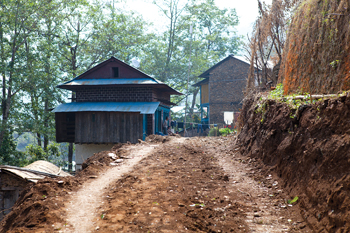New roads are changing the economy of previously inaccessible districts of eastern Nepal

ALBAN VON STOCKHAUSEN
The excavator had clawed a road to Bakshila of Khotang district a few days earlier and the bajar was buzzing with excitement. Bakshila was finally coming of age. Although an 18km stretch connecting the town to the Midhill Highway is yet to be handed over, impatient residents are already using the unfinished road and it is a source of pride. Carved through the mountains by an excavator, however, the road looks unlikely to survive this monsoon season.
Unlike most villages in Khotang, (see map Road from nowhere to nowhere) Bakshila is not homogenous and the ethnic and religious mix seems to be preventing the town from working together. Communities north of Bakshila have got together to ensure electricity and drinking water supply, but the town itself has no power and water is scarce. Work on the road to Bakshila was started once the regional highway reached nearby Jalpa four years ago through the combined effort of three surrounding VDCs which topped off the district-level budget. But the lack of money means it will remain a dirt track for now.
“We can’t upgrade the road unless we get some support from donors or the central government,” says local road promoter, Ratna Mani Rai. The new road is not the only one coming to town, another village-level road is being built to connect Bakshila to the district capital in Diktel. To avoid duplication, the villages could have pooled resources to build one good road, but as elsewhere politics and corruption take their toll. Still, Bakshila residents hope to capitalise on their popular Wednesday market and become a trade hub in the area. Farmers hope they can sell produce without having to pay for porters and mules to carry the load to Diktel. Bakshila hopes to sell cardamon worth Rs 40 million a year once the road is fully operational.
A further four hour walk north is Sungdel and talk of the approaching road has already got residents excited. Preparations are already underway to setup a committee to extend the road there and there are disagreements about two proposed alignments: one along the ridgeline and another one passing the local school. Before the roads started snaking up the mountains, Sungdel was the most remote part of Khotang: a two-day walk from Diktel and three days from the closest airport in Lamidada. Isolated and neglected, nothing ever happened in Sungdel and the government was virtually absent. Today, the dZi Foundation has tied up with a local group called Creative Porters Society to start community projects to improve livelihoods through farming. Five years ago, hardly any vegetable was grown in the three villages around Sungdel. Farmers grew millet, maize, potatoes, wheat, barley and buckwheat on rainfed terraces. Now, they are growing tomatoes, onions, radish, cabbages, cauliflowers, and broccoli.
With improved nutrition, children became healthier and the farmers’ perception of themselves changed. What they once thought as barren land suddenly held possibilities. Sungdel is now a flurry of farming activity and cash crops like cardamom, chiraito, argeli, and lokta have injected new income. Farmers are also starting to experiment with fruits, which they hope to export when the roads finally get to Sungdel.
Cash from crops
A road can be a double-edged sword: it can wipe out local products because of cheap imports from the city, or it can provide access to the market for local produce.
As the roads reach remote VDCs in Khotang, farmers see the potential of investing in cash crops. But they still face bureaucratic hurdles, fluctuating prices for crops, and exploitative middlemen.
Lakpa Sherpa (left) in Sungdel says the road will make it easier to sell his medicinal herbs, but most other farmers are unaware of market rates, transport cartels, and official paperwork. When a local forestry official tried to ask Sherpa for a bribe recently, he organised other farmers to stage a protest.
Now, farmers from surrounding VDCs have set up the Srijansil Jadibuti Production Cooperative to collect and sell produce. The cooperative gives farmers strength in numbers, allows them to bargain for a good price, and to confront corrupt officials.
Supported by CPS and the dZi, the cooperative expects itself to be self-sustaining by next year and turning a profit in the near future.
Explains Gyan Bahadur Bhattarai of dZi: “The idea is to protect the interest of farmers to strengthen their collective bargaining power and insulate them from corruption.”
Read also:
Road from nowhere to nowhere